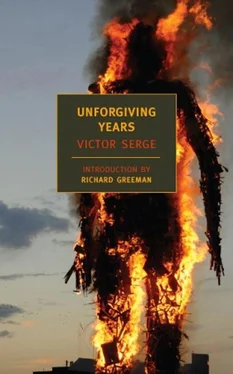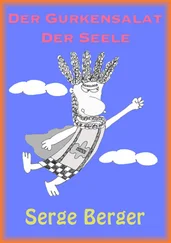Victor Serge
UNFORGIVING YEARS
Translated and with an introduction by Richard Greeman
Translator’s Introduction
UNFORGIVING Years is at once the most bitter, the most cerebral, and the most poetic of Victor Serge’s seven novels. It was first published in France in 1971 — twenty-five years after the author’s death — and has never appeared before in English. The setting is World War II, and Serge pushes realism to the modernist limits of hallucination, presenting extravagant, terrifying, poetic visions of men and women prowling the debris of a self-destructing mechanical civilization. In Unforgiving Years Serge captured the surreal “twenty-fifth hour” atmosphere of World War II in a way that, according to the critic of Le Monde , “prefigured and preceded post-war German literature.” [1] 1. Paul Morelle, “ Les Années sans pardon de Victor Serge ,” Le Monde , September 3, 1971, p. 11.
The novel poses — without answering — the questions of political action, art, and human consciousness; or rather “answers” them through mysterious metaphors like “the central fire,” “funeral masks [that] lie preserved in the earth,” and the impudent, irresistible phallic power of a banana…
Unforgiving Years is divided into four sections, four symphonic “movements,” each of which evokes its distinctive time and place through its tone and atmosphere. The first movement, entitled “The Secret Agent,” expresses the sinister unreality of a Paris indifferent to the approach of war in a chill minor key. The second, “The Flame Beneath the Snow,” is discordant, heroic, and secret like one of Shostakovich’s wartime symphonies. It portrays a frozen, starving Leningrad during the “thousand days” of the Nazi siege. The third movement, “Brigitte, Lightning, Lilacs,” imagines the final days of Berlin under Allied bombardment in mode of Wagnerian Götterdämmerung, while the final movement, “Journey’s End,” is a tragic requiem set in the stark, volcanic Mexican selva where death and life repeat their endless cycle.
Against this panorama of planetary catastrophe, Serge poses his collective protagonist: a quartet of loyal, idealistic Soviet secret agents, veteran revolutionary fighters from the Russian Civil War period (1918–1921), now disillusioned. Operating in Europe where Hitler is triumphing and war looming, their faith in the Party is shaken by the Moscow Trials and the Stalinist totalitarian nightmare developing back in Russia. Caught in this “labyrinth of madness,” [2] 2. All quotations from Serge’s Memoirs of a Revolutionary (Oxford University Press, 1963), an indispensable introduction to twentieth-century revolutionary politics for readers who don’t want to die asphyxiated by political correctness. With close-up sketches of Lenin, Trotsky, and the Bolsheviks; anarchists like Voline, Bill Haywood, Emma Goldman; and poets like Alexander Blok, Andrei Biely, Sergei Esenin, and Vladimir Mayakovsky.
torn between a heroic sense of duty and the recognition of a historical impasse, doomed to be eliminated by the GPU apparatus if the gestapo doesn’t get them first, they search for an escape from a “world without possible escape” while trying to make sense of history and of their individual lives.
Serge’s authentic depictions of character and place are based on his own experiences as a European Communist in the Russian Civil War and an agent of the Comintern in Central Europe. The locales of the novel — Paris, Leningrad, Berlin, Mexico — were the places where he had lived and struggled. Which leads us to the double question: Who was Victor Serge, and why do we still have to have to ask that question in 2007? [3] 3. Jim Haberman first asked this question twenty years ago in the title of his Voice Literary Supplement article on Serge (November 30, 1984).
During his lifetime, Victor Serge (pseudonym for Victor Lvovich Kibalchich, 1890–1947) was admired (or persecuted) both as a French novelist and as a Russian revolutionary. [4] The name Kibalchich is famous in Russia because of a distant relative of Victor’s father, the Narodnik N. I. Kibalchich, who was hanged in 1881 for his participation in the assassination of Czar Alexander II.
As distinct from many Western writers and intellectuals — for example Koestler, Malraux, Orwell, or Silone — who flirted at one time or another with revolution, Serge-Kibalchich was a revolutionary and an internationalist more or less from birth, and remained one to his death. The stateless son of exiled anti-Czarist Russian parents wandering Europe “in search of good libraries and cheap lodgings,” Serge was born “by chance” in Brussels, Belgium. Home-schooled by these penniless, idealistic exiled scholars, young Victor imbibed the heady traditions of the Russian revolutionary intelligentsia while growing up poor on the streets of Brussels. So poor that at age eleven he watched horrified as his younger brother died of malnutrition, while he survived on the pilfered sugar soaked in coffee that little Raoul refused to eat. “Throughout the rest of my life,” he recalled, “it has been my fate always to find, in the under-nourished urchins of the squares of Paris, Berlin, and Moscow, the same condemned faces of my tribe.”
At age fourteen Victor is a militant Socialist Young Guard; at fifteen a member of a rebel gang of Brussels apprentices writing and printing their own radical anarchist sheet, The Rebel (pseudonym Le Rétif : “The Maverick”). At eighteen he is starving in Paris, devouring the contents of the Sainte-Geneviève library while editing L’anarchie , lecturing on anarcho-individualism, giving Russian lessons, and translating Russian novels to survive. At twenty-one Kibalchich is sentenced to five years in a French penitentiary for refusing to rat on his anarchist brothers from Brussels who, unwilling to be master or slaves, became bandits — the first ever to use automobiles to attack banks (the police had bikes). Known as “the tragic bandits,” most of them die in shoot-outs with the Paris police or on the guillotine. Released from prison in 1917, Victor is expelled from France and comes back to life in Barcelona, where he works as a printer, participates in a revolutionary workers’ uprising, and publishes his first article signed “Victor Serge.” The title: “The Fall of a Czar.”
Soon Serge is attempting to reach revolutionary Russia via Paris, where he is arrested as a “Bolshevik suspect” and held for more than a year in a typhus-infested camp. There he meets his first Bolshevik. Exchanged for a French officer held by the Soviets, he arrives in St. Petersburg (then called Petrograd, later Leningrad) in January 1919. While crossing the frozen Baltic Sea in a prisoner’s convoy he falls in love with Liuba Russakova, the daughter of a Russian anarchist. Victor joins in the defense of the frozen, starving Red capital, besieged by Western-backed White armies. Twenty-odd years later, he will draw on this experience of Petrograd under siege to portray the Germans’ World War II siege of Leningrad in Unforgiving Years. Serge is drawn to the Bolsheviks’ heroic energy and participates in the creation of the Communist International (or Comintern). Despite misgivings about Communist authoritarianism, he joins the Party in May 1919 and writes favorable impressions of the Bolsheviks for the anarchist press back in France. [5] 5. See Victor Serge, Revolution in Danger: Writings on Russia 1919–1921 , translated by Ian Birchall (London: Redwords, 1997).
However, by the spring of 1921 Serge’s loyalties were severely torn when anarchist and dissident Communist sailors rebel and seize the island fortress of Cronstadt. Serge joins in the thwarted attempt by the American anarchists Emma Goldman and Alexander Berkman to mediate the conflict and then looks on in horror as the rebels and Communist volunteers massacre each other in a fratricidal combat across the melting ice floes. [6] 6. Cronstadt later became a bone of contention between Serge and Trotsky in exile.
Читать дальше












